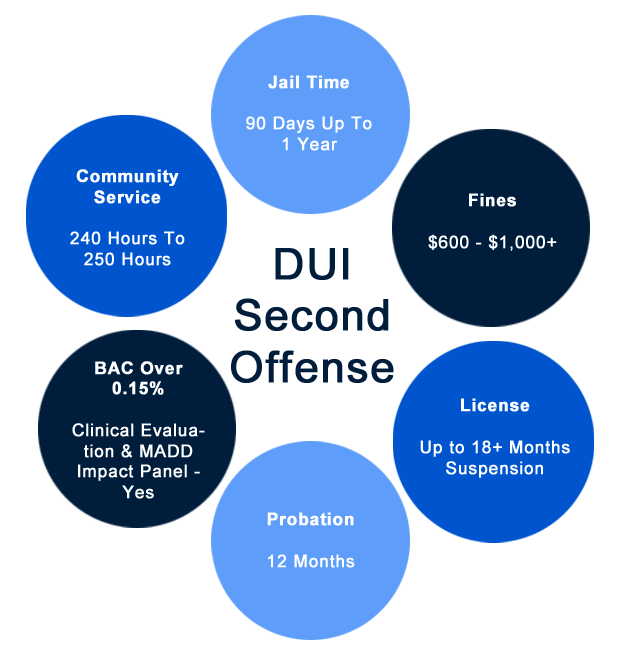
DUI Second Offense in Georgia
As many consequences and penalties as a DUI brings with it, there are far more that await you if you are charged with a second DUI offense. Jail time and fines both increase, as do the length of your license suspension. And that’s important to know: when faced with your second DUI in the state of Georgia, you are actually looking at two or even three cases against you. The first is against your driver’s license, impacting your driving privileges. The second aspect of another DUI is the permanent mark it will leave on your criminal history. Finally, there are the repercussions of your prior offense, and the impact they can have on your current DUI charge. If you are facing your second DUI in the state of Georgia, it is vital that we keep as much of your past history out of the courtroom as possible.
Criminal DUI Charge 10 Year Lookback Periods for DUI
In many other states, the so-called “look back period” is only five years. That is to say, if you are charged with your second DUI in the span of five years, you will be charged as a second offender. Georgia, however, takes DUI very seriously and has a ten-year look back period. Essentially, if you have had a prior DUI within the last ten years, as measured between the arrest dates, that history will be used to determine whether the latest charge will be a felony or a misdemeanor. In addition to establishing a longer look back period, the Georgia legislature has also set a separate set of sentencing options for repeat DUI offenders.
Driver’s License Suspension Lookback Period
While the look-back period for increasing criminal DUI charges is 10 years, it’s worth noting that Georgia’s DUI laws only call for a five-year look-back period when it comes to administrative license suspension. Commonly abbreviated as ALS, this loss of driving privileges is weighed separately from any criminal charges stemming from your DUI.
Is a 2nd Offense DUI In Georgia a Felony Crime?
As mentioned earlier, there are several factors that go into determining whether you are being charged with a misdemeanor or a felony. In general, you can expect to be charged with a misdemeanor in Georgia for receiving a second DUI. In fact, you may be charged with a misdemeanor up to your fourth DUI conviction within the ten-year look-back period. And while you’re not being charged with a felony, a misdemeanor is still a serious charge bringing with it a potential sentence of up to one year in prison.
That said, there are factors that could wind up earning you felony charges for your second DUI in Georgia. If you have caused property damage or serious injury, or if anyone was killed due to your actions, your second DUI will be considered a felony offense.
A Complete Overview of The Driver’s License Suspension for a Second Offense DUI In Georgia
Your Right To Immediately Fight To Appeal your Driver’s License Suspension for a Second Offense DUI
Under Georgia law, you have the right to fight the suspension of your driver’s license by requesting an administrative hearing, but it must be done within 30 days of your arrest. This is nearly always our first step when we are contacted within the 30-day window. In addition to the hearing, you can expect to attend a DUI Risk Reduction program and pay a hefty fee for reinstating your license before it will be reactivated.
As an alternative, you can also apply for a special 12-month permit which allows you to drive using an ignition interlock device. This device will require you to demonstrate your sobriety through a breath test before the car will start and can be acquired through the Georgia Department of Driver Services (DDS).
In general, if this is your second offense within five years measured by the dates between your previous arrest and this one, you can possibly face a hard three-year suspension of your license. This “hard” suspension means absolutely no driving, even with a limited permit, for at least 120 days.


Even with this hard suspension, reinstatement may possible after a period of 18 months. If you meet the requirements for an ignition interlock device or the court waives that requirement; if you successfully complete a treatment program, clinical evaluation and a DUI Risk Reduction Program based on the evaluator’s decision; and if you pay the $300 restoration fee by mail or online ($310 in person) it is possible to have your license reinstated. It’s important to note that if the court waives the requirement for an ignition interlock, you will need to wait 12 months in order to apply for the limited permit.
Otherwise, you may apply for an ignition interlock device permit after 120 days of a hard suspension have passed, if you have met certain requirements. First, you will need to show proof that you have completed a DUI Risk Reduction Program as well as a clinical evaluation. You will also need to be enrolled in either a DUI/drug court program or a Georgia Department of Human Services-approved treatment program for substance abuse. Finally, you will need to have had the ignition interlock device installed before receiving your permit.
In addition to stricter terms for the suspension of your license, you can expect to face greater statutory penalties if this is your second DUI within the past 5-10 years measured between arrest dates.
Below Are the Consequences of a DUI Second Offense
• Jail time: sentencing statutes state that you can face anywhere from 90 days to 12 months in jail. A judge can suspend some of this jail time, but the required minimum is 72 hours.
• Probation: Under Georgia law, the mandatory probation period of 12 months cannot be shortened by a judge. Any jail time served, however, can potentially be subtracted from these 12 months.
• Fines: In Georgia, you can expect to pay at least $600-$1,000. This does not include surcharges, assessments and probation supervision fees mandated by law.
• Community Service: Community service is usually an alternative to harsher punishment like serving jail time in criminal defense cases.
It is a way to give back to the community for any perceived mistakes or mishaps. You will be expected to complete between 240 and 250 hours of community service for a second offense DUI charge.
Additional consequences: In addition to what we’ve outlined above, you will also be required to attend a DUI Alcohol or Drug Use Risk Reduction Program and submit it to evaluation by a clinician. This evaluation is required by Georgia DBHDD regulations and is not subject to a judge’s discretion. Finally, you may also be required to attend a Mothers Against Drunk Drivers Victim Impact Panel.
While Georgia does have a look-back period of ten years, it does lay out a separate set of consequences for those committing multiple DUIs within the span of five years between arrest dates. If you have been charged with DUI and have one on your record from less than five years ago, you can expect the following.
• Publication of your arrest photo and case disposition: This will be published as a legal notice within the county where you reside or within the county where the conviction was obtained and carries a $25 assessment.
• Confiscation of License Plates: You will be required to surrender license plates from any vehicle registered in your name to the court. There are hardship exceptions in cases where multiple members of a home own and/or use the vehicle, but otherwise you will only get your plates back after your suspension ends or you are otherwise permitted.
• Ignition Interlock Device: If so ordered by a judge, you can be required to install an ignition interlock device in your vehicle that will not allow you to operate it until you have demonstrated by breath test that you are sober.
DUI Less Safe Versus DUI Per Se
At the time of your arrest, you may be asked to consent to a breath test of your Blood Alcohol Content (BAC). If this test shows that you have a BAC of .08 or higher, you will be charged with DUI Per Se. However, you can still be charged with what is known in Georgia as “DUI Less Safe” if your BAC is below that level. This essentially means that, while you were still technically sober, you were under the influence to the extent that you posed a threat to yourself and other drivers. While you can be convicted of both DUI Less Safe and DUI Per Se, you will usually be sentenced to one.
Am I Required to Submit to A Blood Alcohol Content (BAC) Test?
It may surprise some people to learn, but the answer is no. While your refusal to consent to the testing of blood, breath or urine may carry its own consequence, you are under no legal obligation to submit. In the state of Georgia, this is known as “implied consent.”
What is Implied Consent in Georgia?
By receiving your driver’s license in the state of Georgia, you have given consent to state, county and local law enforcement to test your sobriety in the field or through chemical tests at the time of a traffic stop. Should you refuse, you will face the risk of automatic suspension of your license along with other possible consequences.
Refusing The Breath or Blood Tests
If this is your second DUI and you refuse a breath or blood test of your BAC, you will automatically trigger a three-year suspension of your license. In addition, this refusal can be used as evidence in determining criminal charges against you.
If, however, you do submit to testing, you are entitled under Georgia law to pay for additional testing by a professional of your choice. The arresting officer may choose to ignore this request but doing so gives you contradictory evidence to use in your defense.
What Are Forced Blood Draws in Georgia?
At the time of your arrest, the officer will read the notice of implied consent warning and then ask if you consent to a blood or breath test administered by the state. As mentioned, you can decline. However, the officer can now either add your refusal to their arrest report or seek a warrant. Issued by a magistrate judge, this Forced Blood Draw gives the officer the right to draw your blood either at a jail or a nearby hospital depending on the county. With this warrant in hand, the officer will have the legal authority to restrain you if necessary to take your blood. Please keep in mind that these forced blood draws can be contested in court.
What If I am Accused of DUI Drugs or Combination of DUI and Drugs (DUID) for a Second Offense
While the consequences of a second DUI are considerable, they are even harsher if you are convicted of impaired driving a second time involving drugs. Expect to have your license suspended for 12 months, as the state of Georgia offers very few exemptions in cases involving drugs or a combination of drugs and alcohol. These exemptions are generally only granted if you participate in one of the state’s alternative sentencing programs, and even then, you will only be allowed to drive to and from work.
In addition, you can expect to face criminal charges at both the state and federal levels stemming from your use and possession of illegal drugs.
How Can the Claiborne Firm Help?
By making it a point to be better prepared than the prosecution and the arresting officer for your DUI, the Claiborne Firm is routinely able to reduce or dismiss charges from a DUI. We are also very successful at helping clients regain their ability to drive quickly. We dig deep into the facts, and we come into that courtroom ready to fight and win.
And make no mistake, it is a fight that we have won again and again. A charge of DUI on your permanent record can have a massive longstanding impact on your life, career, and family. You don’t want a bargain basement attorney by your side for that will plead you out and ruin your life. Before you contact us, interview several DUI attorneys. Ask them what their defense will be, and ask them about their history of winning and losing cases like yours. And then ask us the same questions. You’ll be glad you did.
Because we will not only demonstrate that we can win your case, we will show you the options before you and give you peace of mind. A second DUI does not need to be a permanent part of your criminal record, and it doesn’t need to control you. We can empower you to take that control back and regain your life. Please call (912) 351-8775 or submit your contact details below to schedule a free case evaluation.
Call (912) 351-8775 or Schedule a Free Case Evaluation Online





